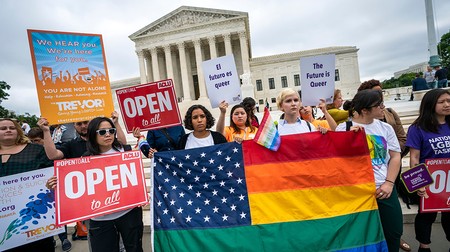Supreme Court Sides With Colorado Baker Who Refused Service to Gay Couple
By Ted Johnson
LOS ANGELES (Variety.com) – WASHINGTON — The Supreme Court sided with a Colorado baker who refused to make a wedding cake for a gay couple on religious grounds, but the majority opinion appeared to still leave questions of religious freedom vs. LGBT rights unresolved.
After the baker, Jack Phillips, refused to make the cake for the couple, David Mullins and Charlie Craig, they complained to the Colorado Civil Rights Commission.
In a 7-2 majority opinion, Justice Anthony Kennedy faulted the commission for “a clear and impermissible hostility” to Phillips’ religious beliefs.
He wrote that the court’s “precedents make clear that the baker, in his capacity as the owner of a business serving the public, might have his right to the free exercise of religion limited by generally applicable laws. Still, the delicate question of when the free exercise of his religion must yield to an otherwise valid exercise of state power needed to be determined in an adjudication in which religious hostility on the part of the state itself would not be a factor in the balance the state sought to reach.
Phillips had argued that his free speech rights were violated.
Chad Griffin, the president of the Human Rights Campaign, said that the decision was so narrowly focused as to not change civil rights laws.
“This is a narrow ruling by SCOTUS against the Colorado Commission, but opinion also acknowledges that LGBTQ people have equal right to be free from the indignity of discrimination,” he wrote on Twitter.
“Anti- extremists did not win the sweeping ‘license to discriminate’ they have been hoping for — and today’s ruling does not change our nation’s longstanding civil rights laws,” Griffin said. HRC filed an amicus brief in the case, and a number of corporations lent their names in support , including Amazon and Apple.
The case had been closely watched among civil rights groups and LGBTQ activists, who feared that a more sweeping ruling could have undermined same-sex marriage if the high court found a broader religious freedom exemption.
Still, some activists fear that there are more challenges to come.
Annise Parker, the former mayor of Houston and CEO of the LGBTQ Victory Institute, said that while the ruling was narrow in scope, “opponents of equality will use it to try and open the floodgates. Homophobic forces will purposefully over-interpret the ruling and challenge existing non-discrimination laws by refusing service to LGBTQ people in even more situations – denying them dinner at a restaurant, lodging at a hotel, or renting an apartment.”
Evan Wolfson, who led the group Freedom to Marry, wrote that the decision was “better disingenuous than disastrous. And even in this compromise/punt, the Supreme Court still holds 7-2, that discrimination can be prohibited.”
In the opinion, Kennedy wrote that while “religious and philosophical objections are protected, it is a general rule that such objections do not allow business owners and other actors in the economy and in society to deny protected persons equal access to goods and services under a neutral and generally applicable public accommodations law.”
Attorney General Jeff Sessions said that the Justice department was pleased with the decision.
“The First Amendment prohibits governments from discriminating against citizens on the basis of religious beliefs,” he said in a statement. “The Supreme Court rightly concluded that the Colorado Civil Rights Commission failed to show tolerance and respect for Mr. Phillips’ religious beliefs.”

